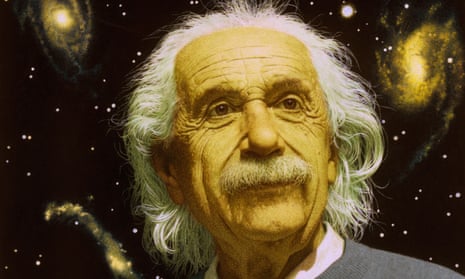A decades-long search for gravitational waves is expected to end in triumph this week when scientists declare they have discovered ripples in the fabric of spacetime, possibly created by the collision of two massive black holes travelling at close to the speed of light.
First predicted by Einstein, and generated by the most cataclysmic events in the cosmos, gravitational waves stretch and squeeze space and all within it as they spread out across the universe. Their discovery, if confirmed, is certain to earn a Nobel prize.
Scientists have hunted for signs of the waves for decades, but until now, their attempts have been frustrated by false signals and instruments that were not sensitive enough to detect the waves by the time they reached Earth.
That is expected to change on Thursday, when physicists in the US reveal their latest data from an experiment known as LIGO, or the Advanced Laser Interferometer Gravitational-Wave Observatory. The team have detectors in Washington and Louisiana that can spot passing gravitational waves via the minuscule changes in length they produce in two 4km-long pipes.
At a press conference in Washington, LIGO scientists are anticipated to reveal a clear, unambiguous gravitational wave signal. It may have come from two vast black holes, one 29 times more massive than the sun, the other 36 times more massive, spiralling around each other and finally crashing together to form a new black hole 62 times the mass of the sun. For all its heft, the new body may be no more than 200 miles wide.
The missing mass - equivalent to that of three suns, or six trillion trillion kilotonnes - was converted into energy and released as the gravitational waves LIGO is believed to have detected.
“People are hugely excited. The rumour is that it’s a whopping big signal, in other words, it’s unambiguous, and that is fantastic,” said Pedro Ferreira, professor of astrophysics at Oxford University, and author of the 2014 book, The Perfect Theory: a century of geniuses and the battle over general relativity.
When Einstein published his theory of general relativity in 1915, he changed forever how scientists view the universe. The theory showed that mass makes spacetime curve, an effect that has a multitude of implications. One, that light from distant stars will bend around the sun, was confirmed by Arthur Eddington during the solar eclipse of 1919.
The detection of gravitational waves would tick off the last major prediction of general relativity. It would demonstrate that the equations drawn up by Einstein, who refused to believe in black holes himself, hold true in what ranks as the most extreme realm of physics.
But there is more to the discovery of gravitational waves than simply proving they exist. If the LIGO signal is as strong as rumours suggest, new instruments could be built to detect gravity waves from colliding black holes and other hugely energetic events all over the universe.
“It would be like having a telescope that, instead of looking at objects in the electromagnetic spectrum, is looking at them with gravitational waves,” said Ferreira. “We could see things in a completely different way. It would be very blurred vision - gravitational waves are not good at pinpointing objects - but they would help us understand what happens when black holes hs fall into one another.”
“The fact is whenever we’ve looked at the universe in new ways, with x-rays, with radio waves, we’ve discovered incredible stuff, exotica. So this is going to open up a new window, and for sure we’ll discover bizarre stuff,” he added.
Rumours that the LIGO team had detected gravitational waves have been circulating in the astrophysics community for months. But many researchers were sceptical and feared the rumours might have been sparked by synthetic signals which are added to the data to test the team’s analytical procedures.
“After all the rumours over the past few months I certainly expect them to announce a detection at this point,” said Alberto Sesana, a researcher at the University of Birmingham’s Gravitational Wave Group. “We have to bear in mind that LIGO is one experiment and the only one that can detect such sources. If they claim to have detected gravitational waves, it cannot be confirmed by another instrument, and that is always an issue. But they have been very cautious in doing this properly. I’m confident they have clear and strong evidence for it.”
There is a chance a signal will be announced from another source, such as a pair of neutron stars spinning around one another, or a neutron star falling into a black hole. But such cosmic events would be expected to produce weaker signals than the large spike scientists anticipate the LIGO team to reveal.
Scientists have declared the discovery of gravitational waves before only to have their hopes dashed. In 2014, researchers on an experiment called Bicep2 claimed to have found evidence for gravitational waves from the big bang, but further analysis by other groups showed that the signals they picked up could be entirely explained by space dust interfering with their measurements.
Ulrich Sperhake, a theorist at Cambridge University who studies how gravitational waves are generated by black holes, said the community was very excited and expectant. “ I don’t know anyone in the field who expects anything other than a detection to be announced,” he said. “Anything but the onset of a new era in observational gravitational astronomy would come as a major surprise on Thursday, but there remains a tiny speculative element to it until we’ll have the official LIGO announcement.”
Martin Hendry, a member of the LIGO team at Glasgow University, would not be drawn on the details of Thursday’s announcement. “I can’t say anything more at this stage than wait and see. Or should that be “watch this spacetime?” he said.

Comments (…)
Sign in or create your Guardian account to join the discussion